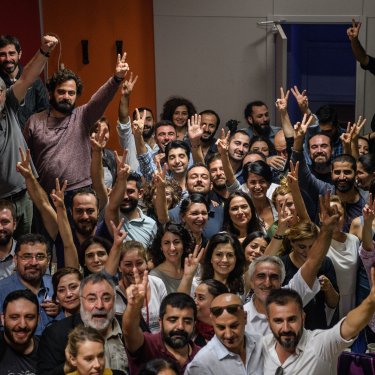Raids on opposition stations end broadcast pluralism in Turkey

Reporters Without Borders (RSF) condemns the abrupt closure of many leading opposition radio stations and TV channels in police raids yesterday and voices alarm at the systematic way the authorities are eliminating media pluralism in Turkey.
The programmes of several Istanbul-based opposition outlets, including IMC TV, Hayatin Sesi TV and Özgür Radyo, were cut short in mid-broadcast when the police suddenly arrived, evicted staff and placed seals on the entrances.
The raids were carried out as a result of a decision by the High Council for Broadcasting (RTÜK) to rescind the licences of at least 12 TV channels and 11 radio stations on suspicion of “complicity with terrorist organizations” and posing a “danger to national security”
Taken under Decree No. 668, imposing a state of emergency five days after the failed coup d’état of 15 July, the decision followed a meeting two days ago of the National Security Council, which groups the government and security forces.
The targeted media outlets, which were either left-wing or served the Kurdish or Alawi communities, are all now closed or are under police seal, joining the long list of media already eliminated by decree since the start of the state of emergency. They have also been dropped from the national radio and TV satellite Türksat and their websites have been blocked.
“The elimination of entire media organizations in such a sweeping manner and without due process is indefensible in a democratic state and means the end of broadcast pluralism in Turkey,” said Johann Bihr, the head of RSF’s Eastern Europe and Central Asia desk.
“It is chilling to see police raids on media outlets becoming routine in Turkey. If not amended without delay, the state of emergency will end up crushing media freedom as surely as the military coup would have, had it been successful.”
The raid on Özgür Radyo was particularly violent. The police smashed the door and arrested seven employees, as well as other journalists who had gone there to cover events. They were released this morning.
IMC TV, a broadcaster created in 2011 that was very critical of the government, had already been dropped from Türksat on 20 February as a result of a judicial investigation into suspected “terrorist organization propaganda.” It had continued to broadcast on the Hotbird satellite and the Internet.
The closures have elicited many protests from journalists’ unions and associations, which observed the police raids, gave news conferences and staged demonstrations in Istanbul and Diyarbakir, a southeastern city with a mainly Kurdish population.
At the same time, social networks have been inundated with support messages under such hashtags as #HalkınHaberAlmaHakkınaDokunma (Don’t mess with my right to information), #SesimiKesme (Don’t cut off my voice) and #HayatinSesiSusturulamaz (Hayatin Sesi must not be gagged).
RSF issued a report on 19 September about the many media freedom violations under the state of emergency. Turkey is ranked 151st out of 180 countries in RSF’s 2016 World Press Freedom Index.



